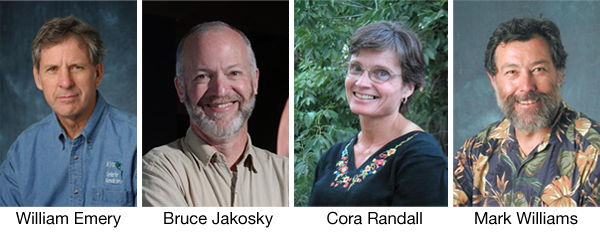Four CU-Boulder faculty members elected American Geophysical Union Fellows
Four University of Colorado Boulder faculty members have been elected American Geophysical Union Fellows for 2012, the most from any institution in the world.
The newly elected AGU Fellows are professor William Emery of the aerospace engineering sciences department, professor Bruce Jakosky of the astrophysical and planetary sciences department, professor Cora Randall of the atmospheric and oceanic sciences department, and professor Mark Williams of the geography department. The CU-Boulder faculty members join 57 other AGU Fellows elected from around the world in 2012, including 41 from U.S. institutions.
One other Coloradan, Daniel Murphy of the National Oceanic and Atmospheric Administration, was elected an AGU Fellow for 2012.
The Fellows are honored for their exceptional scientific contributions in the fields of earth and space sciences.
Emery, of the Center for Astrodynamics Research in the aerospace engineering sciences department, was cited for advances in the remote sensing of ocean surface phenomena, including sea surface temperature variations and ocean surface currents. He also helped develop processing hardware for weather satellites and studies high-resolution satellite imagery for detecting urban change and mapping disaster effects. Emery also has applied high and moderate resolution satellite imagery to the study of terrestrial vegetation.
Jakosky, associate director for science at the Laboratory for Atmospheric and Space Physics, was cited for his illuminating studies of the climate of Mars, and of life in the solar system. Jakosky is the principal investigator on NASA’s $670 million Mars Atmosphere and Volatile Evolution mission, or MAVEN, the first mission devoted to understanding the upper atmosphere of Mars and which is slated to launch next year. His studies include the geology of planetary surfaces, the evolution of the Martian atmosphere and climate and the potential for life beyond Earth.
Randall, who also is affiliated with LASP, was cited for her contributions to our understanding of the impact of energetic particles on the atmosphere. Randall is principal investigator for the Cloud Imaging and Particle Size experiment on NASA’s Aeronomy of Ice in the Mesosphere satellite, or AIM, which is studying long-term changes in ice crystal clouds in the mesosphere and their relationship to global climate change. LASP designed and built two of the three instruments for AIM, which is controlled by a team, primarily undergraduates, from CU-Boulder.
Williams, who is affiliated with CU’s Institute of Arctic and Alpine Research, was cited for outstanding research that has made fundamental advances in mountain hydrology and biogeochemistry. He has worked in the Rocky Mountains, Sierra Nevada Mountains, the Himalayas, the Andes and the Alps and is the principal investigator on a $5.9 million grant to CU from the National Science Foundation to continue intensive studies of long-term ecological changes in Colorado’s high mountains, both natural and human-caused, over decades and centuries.
Established in 1919 to further advance the science of geophysics both on Earth and on other planets, the AGU is an international, nonprofit organization with more than 60,000 members worldwide. AGU Fellows make up no more than 0.1 percent of members in any given year.
Trailing CU-Boulder in the number of AGU Fellows elected for 2012 were eight universities with two each: the University of California, Los Angeles, the University of California, Irvine, Johns Hopkins University, the University of Michigan, Penn State, Texas A&M University, the University of Tokyo and the University of Durham in England.
“This is a great honor for the University of Colorado Boulder and shows once again our faculty are working and teaching at the frontiers of science,” said CU-Boulder Vice Chancellor for Research Stein Sture. “To lead the world in the number of fellows elected by the American Geophysical Union in 2012 is indicative of the quality and depth of CU-Boulder’s research and education in both earth sciences and space sciences.”


